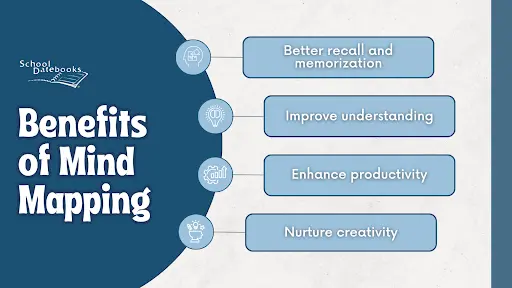Benefits of Mind Mapping

As a student, you take in a ton of information daily and the further along you go in your academic journey, the more complicated concepts will become. Whether you’re studying for a test, organizing your thoughts for a paper, or brainstorming ideas for a project, managing all that information can become overwhelming. That’s where mind mapping comes in.
What is mind mapping?
While the concept of mind maps has been around since the third century, the term was actually coined by Tony Buzan in 1974. The Buzan Method of mind mapping starts with a central theme or concept and uses branches to show the basic ordering of ideas (BOIs). Smaller branches are added to connect ideas related to the BOIs, sometimes color-coded, with branches radiating from those new ideas, and so on.
The Buzan Method is just one of many methods of mind mapping but at its core, a mind map is a visual representation of ideas, concepts, and information. All mind maps typically start with a central idea or topic and branch out into related subtopics and concepts. Each branch can further branch out into more detailed information, creating a hierarchical and structured overview of a subject.
Benefits of Mind Maps
Mind mapping isn’t just a trendy study hack; it’s a game-changer that offers numerous benefits tailored to your needs.
- Better recall and memorization – If you’ve ever been studying and quickly forgotten what you just read or how it connects to the big picture, you’re not alone. Mind maps engage your visual memory, making it easier for your brain to recall information when you need it the most. That means you’ll experience more effective and efficient studying sessions.
- Improve understanding – Mind maps help you break down complex subjects into digestible chunks. They help you see the big picture while maintaining a grasp of the finer details. You’ll not only remember facts but also grasp the concepts behind them.
- Enhance productivity – Mind mapping can make it easier to study important information or brainstorm topics. That means you won’t be spending hours trying to figure out how to connect the different parts of your essay or project. Instead, you can work faster and more efficiently.
- Nurture creativity – If studying your written notes isn’t cutting it, consider using mind maps for a more creative touch. Mind mapping injects a healthy dose of creativity into your learning process. By visually connecting ideas, you’re encouraged to explore new connections, leading to “aha” moments you might not have come across otherwise.
Mind mapping is a versatile and invaluable tool for students. It can help unlock your creativity, improve your memory, and organize your thoughts effectively. So, start mind mapping today and watch your academic journey take a more structured, colorful, and successful path!



